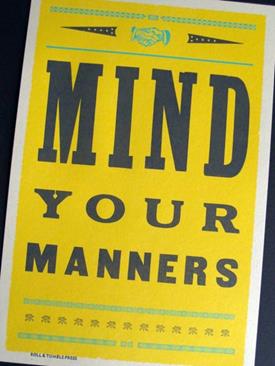What problem? Who said anything about a problem?
Maybe I’m a little old fashioned. Or maybe it’s because I’m of the Baby Boomer generation. Probably both. My parents ensured manners were, without question, a mandatory part of my upbringing (along with that of my three brothers). Growing up in the 1960’s, lessons in manners started as soon as words started coming out of your mouth. I think all Boomers remember that. Our parents drilled into us to always use our manners. This included “please,” “thank you,” and “you’re welcome.” Not “no problem.”
Learning how to be respectful and polite, especially to adults, was essential. Any outing in which the plans called for you to be away from your parents – especially if you were to be around other adults – began with a final command from Mom or Dad that went something like, “and remember your manners!” If I were to drop a “no problem” after someone said “thank you” back then, I would have felt a swift slap on the back of my head that would likely have knocked me off balance.
If this was one of those trendy lines that seem to come and go, I’d probably be OK with it. But for some reason this one is sticking around. I continuously hear more and more people using it, and I’ve even heard it used in TV commericals! How did this replace “you’re welcome,” and why are we constantly talking about a problem? Why even bring up the word “problem?” I believe if someone is thoughtful enough to say “thank you,” their politeness should be returned accordingly. Not with “hey – no problem!” What’s next? Homes with “no problem” mats outside the front door?
On the flip side, I would like to commend Chick-fil-A. In my visits to their restaurants, the reply to “thank you” is commonly “my pleasure.” I’m guessing this came down as a corporate decision. Never the less, it’s an excellent choice and certainly deserves an “A” in the manners column! Good job Chick-fil-A!
As humans, we tend to do a lot of things out of habit. I know the “no problem” reply is part of the everyday communication process for some with no intention other than to say “you’re welcome.” If “no problem” is part of your daily vernacular, may I make a friendly suggestion that you consider swapping out some terminology, especially in the business world. It’s not what you think, but more so the impression you leave with others that determines whether or not your were polite, respectful, and if you were using your manners!
By the way, you’re welcome. You’re very welcome.
Dan Reynolds, Technical Sales